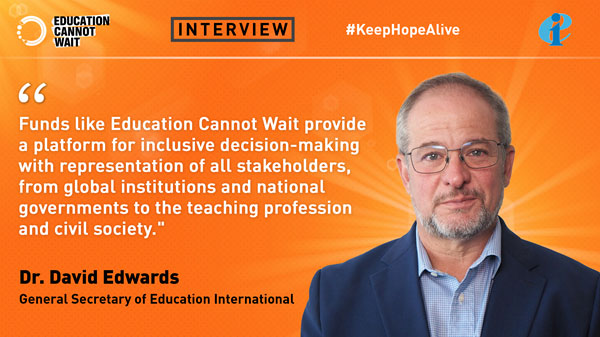UPDATE: Dr. David Edwards, General Secretary of Education International, is urgently calling for increased funding for teachers in crisis settings as the global education crisis deepens. With 44 million additional primary and secondary teachers needed worldwide by 2030, the situation has reached a critical point.
In an exclusive interview, Dr. Edwards stressed that millions of vulnerable children are deprived of education simply due to a lack of qualified teachers. “What is education without teachers?” he emphasized, citing the dire circumstances faced by educators like Stella Oryang Aloyo, a South Sudanese refugee teacher in Uganda.
Education Cannot Wait (ECW) has reached over 14 million children with quality education, yet the challenges are intensifying. Dr. Edwards warned that delayed salaries and poor working conditions are driving teachers away from the profession. In South Sudan, teachers on government payroll have not been paid for over a year, leading to significant disruptions in education.
“Education cannot wait, and neither can teachers,” Dr. Edwards declared. He urged the global community to prioritize support for teachers, particularly in humanitarian crises where they work under perilous conditions. Governments must take responsibility for fair and timely compensation, and international donors must step up their contributions to multilateral funds like ECW, which streamline efforts and reduce waste.
Dr. Edwards highlighted that multilateral humanitarian funding is crucial for coordinated support. “These funds provide a platform for inclusive decision-making,” he stated, ensuring that teacher organizations can shape educational priorities and interventions effectively.
As the world grapples with budget constraints and technological shifts, Dr. Edwards called for a renewed focus on empowering teachers. “During the COVID-19 pandemic, we saw how critical teacher leadership is for adapting education delivery,” he noted. Teachers must have a voice in integrated response plans to ensure their needs and those of their students are met.
The emotional toll on teachers is significant. Many educators are forced to seek alternative income sources due to irregular salary payments, undermining the continuity of education. Dr. Edwards recounted heart-wrenching examples of teachers risking their lives to protect their students during crises, illustrating the irreplaceable role they play in providing not just education, but also safety and hope.
Dr. Edwards also discussed the importance of localization in education funding, stating that global organizations must shift power to local actors for effective responses. “Investing in local capacity ensures that education responses are contextually relevant,” he explained, emphasizing the need for collaboration between global entities and local stakeholders.
“We can no longer ignore the pressing need for teachers in crisis settings,” he concluded. “If we are serious about achieving Sustainable Development Goal 4, we must ensure that every teacher is paid fully, fairly, and on time.”
As this urgent situation evolves, stakeholders in education are urged to act swiftly to address the mounting challenges and support the millions of children affected by the global teacher shortage. The call to action is clear: without teachers, the future of education hangs in the balance.
